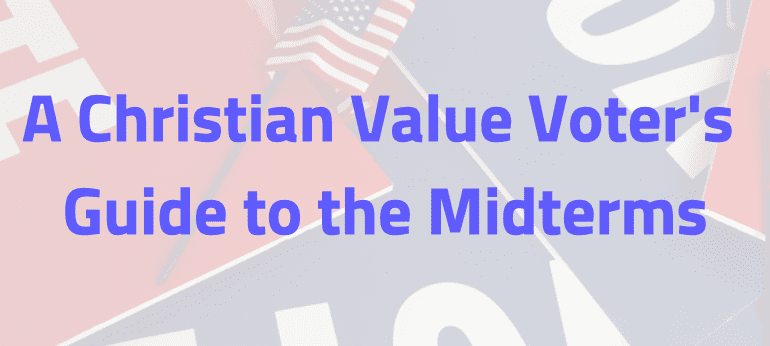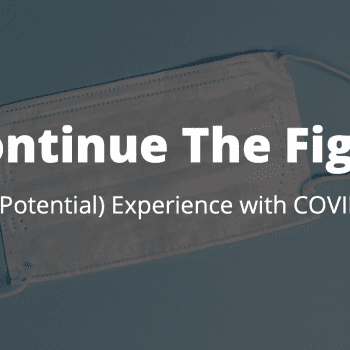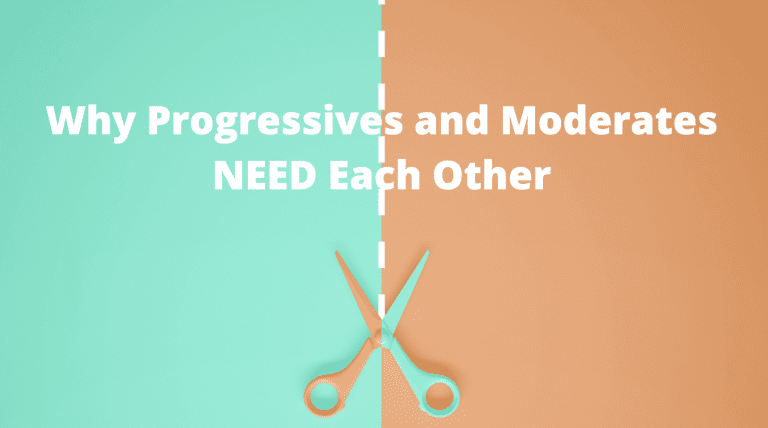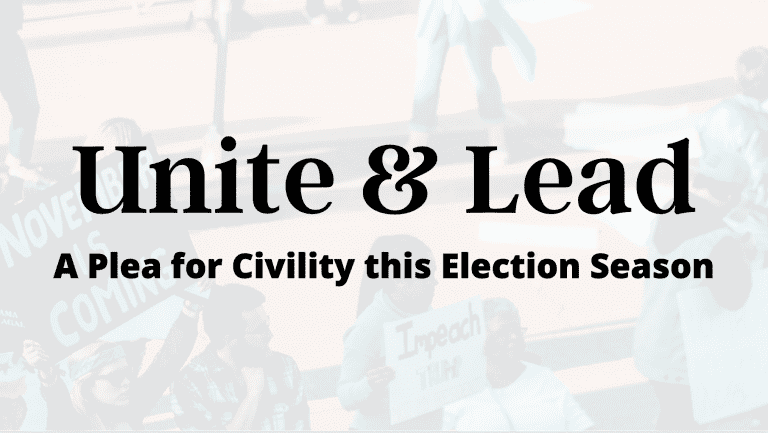The 2018 midterm elections will be some of the most consequential in the recent history of our nation. After experiencing two years under the Trump Administration, these elections are a chance for the American people to voice our opinion on how this administration and its supporters are doing. Do we see the progress that we desire, or does our country need to go in another direction? Do we feel that our voices are represented in government, or do we need new leaders to help speak on our behalf?
For followers of Christ, whenever an election comes around, we also have an opportunity to express our values in the public square. If we believe that the ethics and morals of Jesus are truly the best path to lead all people to flourishing, the election becomes our opportunity to seek to elect candidates that share and promote those values. The goal of voting the values of Christ isn’t so that Christians can gain or maintain privilege and power, rather, it’s to move our country in a direction that favors the common good of all people.
In our recent history, many faith leaders and politicians alike have stood tall and laid claim to the name of Christ while advocating values that were fundamentally opposed to the clear teachings of Jesus. They have fought for policies that favor a select few people at the expense of the majority, and by doing so, have tarnished the witness of Christianity in our country and beyond.
As we approach the mid-term elections this year, it’s essential that followers of Christ take time to contemplate exactly what values our faith calls us to embody and how we should engage in the political process in a way that honors God and brings about the abundant life that Jesus taught was God’s deepest desire.
Today I want to share with you four of the guiding values of the New Testament in order to provoke prayerful thinking as we prepare to cast our votes on Tuesday, November 6th.
- Render unto Caesar what is Caesars.
When Jesus was asked by religious leaders if faithfully Jew’s should continue to pay taxes to Caesar, he realized that he was being tricked. The leaders who were asking the question were trying to get Jesus in trouble, expecting him to tell them to refuse to honor Cesar and the Empire in favor of either launching a revolution to overturn the empire or separating themselves and honoring God alone. In the Roman Empire, Caesar was not just the political leader, but was also seen as a god. In fact, the common title ascribed to the Cesar was “son of God”. To participate in this government could have been seen as giving honor to a false god, which would be a violation of the very first of the great ten commandments handed down to the Jewish people from God himself.
Jesus surprises the religious leaders by responding quite differently than they expected- “Render unto Caesar what is Caesars and to God what is God’s” he replies. In other words, he tells them to be faithful citizens, to engage in the political procedures and uphold the laws of the Empire, while at the same time, living in a way that honors God. And the trick in his statement is this- while the currency and roads and buildings and business of the day was subjected to Cesar, Jesus knew and believed everything belonged to God. So, in his simple answer to the question, he is actually speaking a subversive truth- participate in the political system of the world, but as you do, recognize that everything and everyone ultimately belongs to God, and therefore, seek to honor God in everything.
What would this look like when applied to our modern context of American Democracy? I think it’s simple. Jesus would say to engage in the political system and honor the laws of the land, but as we do, seek to remember that everything belongs to God and that we should seek to reflect the values and desires of God as we engage in the political process. Our nation and all of the people in it belong to God, and we should seek to guide our political systems to reflect the desires of God for the common good of all people equally.
So yes, it is a Christian duty to vote and be engaged in our duties as citizens of this land. It’s also our duty to seek to ensure our votes are guided by God’s values and not our own selfish impulses. But what exactly are God’s values
- Treat others how you’d like to be treated.
The central ethic of Christianity comes from Jesus’ teaching that has become known as “the golden rule”- “Do unto others as you would have them do unto you.” In the ancient world, there were many proverbs like this one, and most often they were framed in a passive, negative way- “Do not do to others what you wouldn’t want done to you.” Jesus flips the script and calls us to be active in our pursuit of doing good for others- sowing seeds of justice and righteousness that will directly benefit our neighbors, and thus, will ultimately benefit us.
Whenever a Christian is faced with an ethical dilemma, we should harken back to this central question: How do I want to be treated in this circumstance or this context? When we answer those questions with raw honesty, we will most often discover what the morally “righteous” path forward is.
Think about the major issues facing our country today- how would you want to be treated if you were the central party being effected? For instance, if you were a refugee fleeing persecution and death in your home country, how would you want to be treated? If you were a transgender individual who simply yearned to live in equity, how would you want to be treated? If you were someone who felt like your freedom of speech or expression was being threatened, how would you want to be treated?
When we ask these questions, and allow the wisdom of this proactive proverb to guide our position on public policy, we will find that our values and voting begins to reflect the attitude of Christ more than the selfish impulses were so prone to fall prey to.
- Act from love, not fear.
This is perhaps one of the principles that Christians often forget in the way that we live out our faith, but is absolutely central if we’re going to be agents of healing in the world. The entire thrust of the ministry of Christ is cause humanity to experience the Ultimate Love that is God and then to embody that to the world around them. This Love, we’re told in the Epistle of 1 John, will expel fear that is linked to judgement. When we are confident that we live, move, and have our being in God and therefore, that the deepest reality of the universe is Love, then we do not have to fear anyone or anything for we know that all will be well.
Fear drives us into a posture of self-preservation, where we see everyone and everything as potentially harmful and dangerous. We believe that unless we put ourselves first that we’re going to be disregarded and taken advantage of. Fear limits our ability to see the bigger picture, to think beyond our current circumstances to how policies will ultimately effect the world around us in the long term.
When love, however, becomes our central belief, we begin to act differently in the way that we engage those around us. We aren’t afraid for our safety or that we’ll not have what we need, but instead begin to think about the safety and wellbeing of others. We begin to move away from thinking from the perspective our own self-interest to the interest of the whole of Creation, aiming for the policies and actions that contribute to this global flourishing. Only Love allows us to follow Jesus’ own example of self-sacrificial living, and only Love can create the change that our nation so desperately needs.
Have faith in the power of Love as you enter in to the voting booth. Have faith in the good in the heart of your neighbors. Refuse to act out of fear or self-preservation, and instead, aim for the flourishing of the whole of society together.
- Defend the vulnerable and the marginalized.
Another key value that runs throughout the whole of Scripture is to constantly seek to uplift the cause of the marginalized and vulnerable of society. In the accounts of Jesus’ ministry contained in the Gospels, we constantly see Jesus interacting with the individuals that were seen as “unclean” or dishonorable by the power brokers of his day. Jesus revealed to us that God’s heart was ever bent towards the marginalized and disinherited, leading Jesus to declare that God’s presence resides specially in “the least of these”.
Since this core value reflects the very heart of God, Christians should seek to reflect these values in every aspect of our life, even and especially our political life. As we enter in to the voting booth, we should be asking questions like: Whose voice needs to be amplified? Who isn’t being heard? Whose life is most at risk in this moment of our nation’s history? These are the people that we should be putting at the forefront of our public policy and who we should be mindful of as we cast our votes. Because the truth is the wealthy, privileged, and powerful will be fine regardless of what happens in an election- the poor, oppressed, and marginalized are the ones who will feel the full weight of even seemingly insignificant social changes.
If we are to be reflections of Christ in the voting booth, we must put the cause of the marginalized at the forefront of all that we do…just like Jesus.
A Concluding Word
Christ-followers have an obligation to reflect the values of Jesus in every arena of our lives- including the political one. Far too often, those who claim the name of Christ have voted in ways that are fundamentally opposed to the values of Christ and our world paid the price. As we engage in our civic duty of voting, may we be mindful of these values at the very core of our faith, and allow them to guide our decisions as we seek to create a better nation and world for everyone.
We want to know what you think about the upcoming midterm elections. Vote in our poll below!












